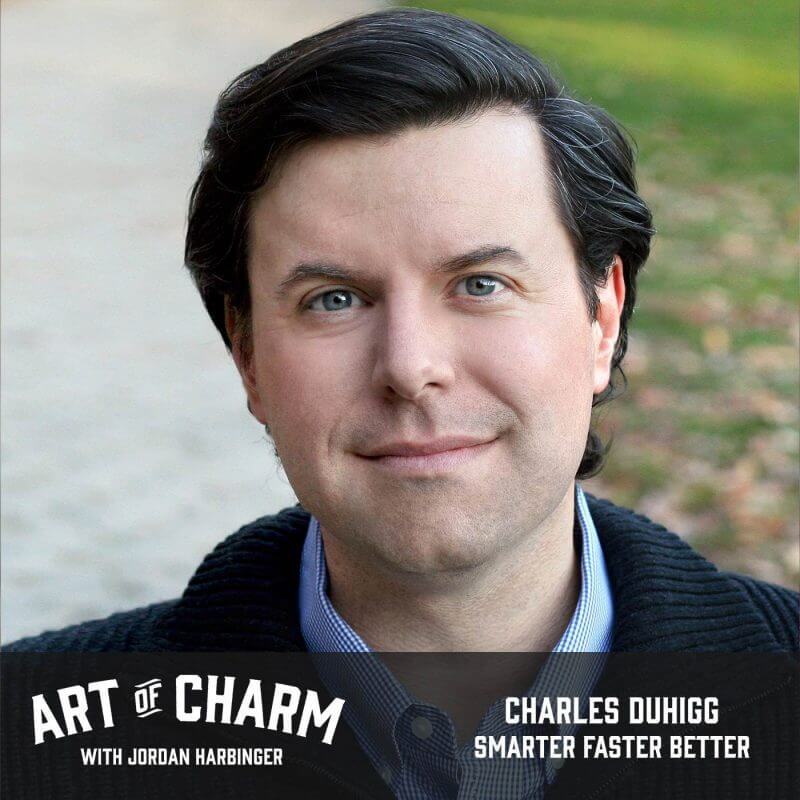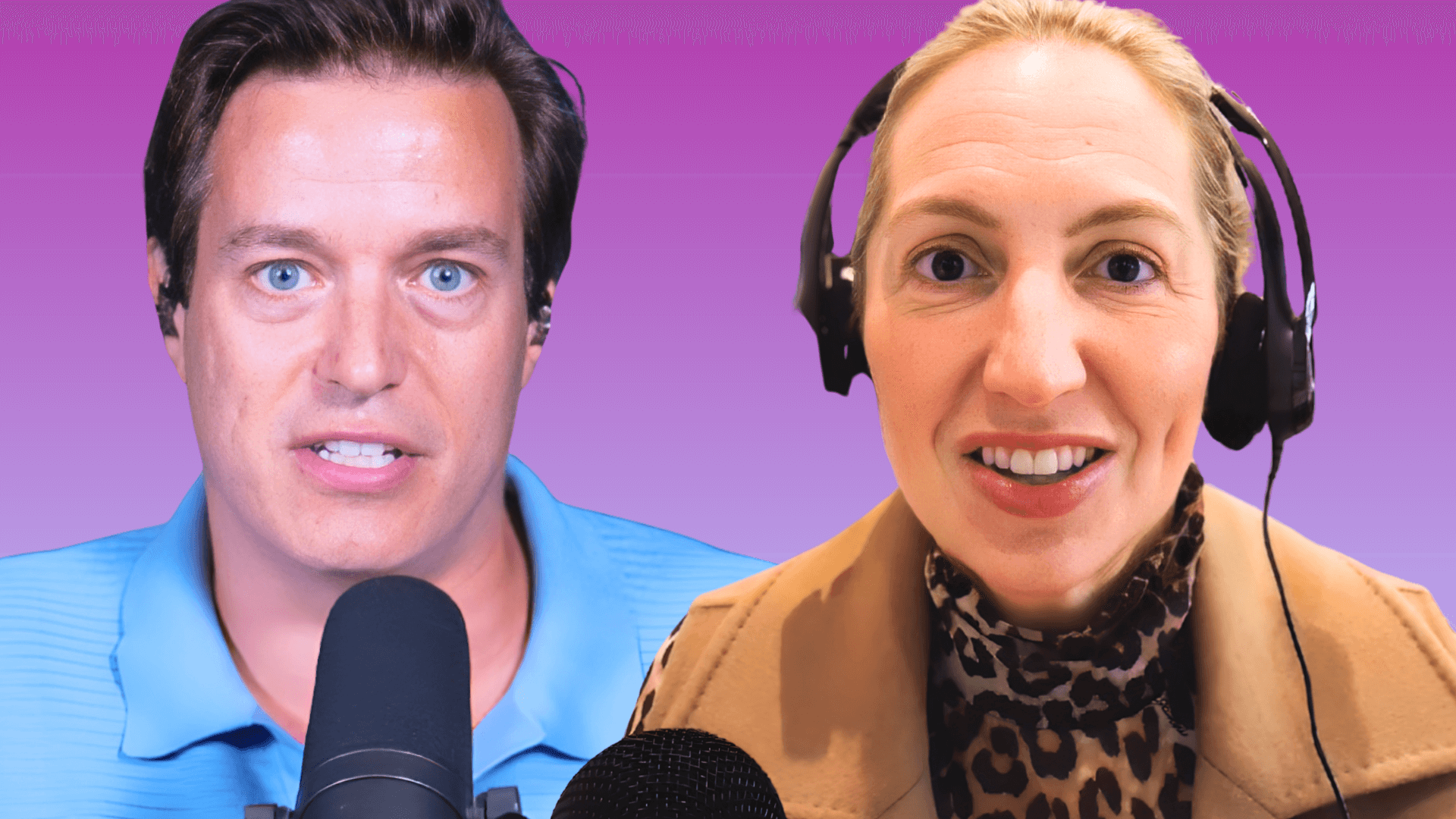Charles Duhigg (@cduhigg) is a Pulitzer prize-winning reporter at The New York Times and author of Smarter Faster Better: The Secrets of Being Productive in Life and Business and The Power of Habit: Why We Do What We Do in Life and Business.
The Cheat Sheet:
- What’s the difference between what we think and how we think?
- Learn more about the science of motivation and what makes us tick.
- Compare the internal vs. external locus of control.
- What is cognitive tunneling and when does it affect us? Discover how we can use mental models to avoid it.
- Find out how to increase creativity even when we hit a block.
- And so much more…
[aoc-subscribe]
The most productive people, companies, and organizations don’t merely act differently from their less productive peers; they view the world — and their choices — in profoundly different ways.
In this episode of The Art of Charm, Pulitzer prize-winning writer Charles Duhigg joins us to discuss the science behind what motivates us and how we can change the patterns that shape our behavior for the better. Charles is the author of Smarter Faster Better: The Secrets of Being Productive in Life and Business and The Power of Habit: Why We Do What We Do in Life and Business. Please enjoy!
More About This Show
Most of us know too well the feeling there just aren’t enough hours in the day to accomplish everything we set out to do. We may wake up in the morning with the best of intentions, but we’ll return to the same bed that night nagged by the spectre of what’s been left undone with the day behind and what tasks need to be tacked on to tomorrow. We know we didn’t live up to our potential, but we really don’t can’t put a finger on why.
In spite of technology arguably designed to make our lives more efficient, we feel the overpowering tug of social media, smartphones, and other distractions of modern life vying for our ever-divided attention. While most of us scramble to multi-task and unsuccessfully mitigate what we experience as a mysterious hemorrhaging of productivity, a select few find a way to defy the noise and thrive.
Charles Duhigg, author of Smarter Faster Better: The Secrets of Being Productive in Life and Business and The Power of Habit: Why We Do What We Do in Life and Business expresses this dichotomy perfectly: “In contemporary society, it is possible to become so busy that you stop being productive.”
So what’s the difference between those of us who seem able to accomplish a whirlwind of superhuman feats in one day and the rest of us mortals who would feel lucky to get as much done in a week? According to Charles, it’s about knowing how to think as much as what we think about.
“What we’re really talking about are these lessons from neurology, psychology, and behavioral economics that tell us how to structure our thinking — how to build what psychologists refer to as contemplative routines that allow us to stay focused on the things that matter the most,” says Charles.
Contemplative routines are essentially habits we build that, as Charles puts it, “give us the space to think about the right things.”
A contemplative routine could be as simple as, while on the way to work every morning, mentally visualizing the day ahead. “If we tell ourselves a story about what we expect to unfold,” Charles says, “it tends to prime our brain much better to pay attention to the things that matter and ignore the things that are distractions.”
West Side Story creator Jerry Robbins had a contemplative routine that involved writing 30-page letters to friends every night as a way to process the events of the day. Your contemplative routine could be somewhere between visualizing what’s in store over the next 24 hours or writing daily novellas — the real point is to create a habit that forces you to think a little bit more.
“Throughout history, the killer app has always been thinking,” says Charles. “The thing that distinguishes the most productive people from everyone else is that they have these habits that push them to think a little bit more about what’s going on.”
Listen to this episode of The Art of Charm to learn more about Charles’ contemplative routines and how we can develop ones that work for us, what the problem of metacognition is and how we can overcome it, how we can better combat disfluency in memory retention, why it makes a difference to turn a chore into a choice, how we can harness the power of “why” to motivate ourselves for the long haul, how to use our methods of self-motivation to motivate others, the internal versus external locus of control, what Google discovered when trying to build the perfect team, what to do when we find ourselves succumbing to cognitive tunneling, how mental models save lives, how to measure and manage increased creativity, why it took Charles two years to write a book on productivity, and more.
THANKS, CHARLES DUHIGG!
If you enjoyed this session with Charles Duhigg, let him know by clicking on the link below and sending him a quick shout out at Twitter:
Click here to thank Charles Duhigg at Twitter!
Resources from this episode:
- Smarter Faster Better: The Secrets of Being Productive in Life and Business by Charles Duhigg
- The Power of Habit: Why We Do What We Do in Life and Business by Charles Duhigg
- The Power of Habit: Charles Duhigg at TEDxTeachersCollege
- Dr. Carol Dweck | The Motivated Mindset (Episode 445)
- What Google Learned from Its Quest to Build the Perfect Team by Charles Duhigg, The New York Times Magazine
- The Power of Mental Models: How Flight 32 Avoided Disaster by Charles Duhigg, Smarter Faster Better via Lifehacker
- You Can Take a Key Business Lesson from the Creation of Disney’s Biggest Hit in Recent History by Shana Lebowitz, Business Insider
- Charles Duhigg’s website
- Charles Duhigg at Facebook
- Charles Duhigg at Twitter
You’ll also like:
- The Art of Charm Challenge (click here or text 38470 in the US)
- The Art of Charm Bootcamps
- Best of The Art of Charm Podcast
- The Art of Charm Toolbox
- The Art of Charm Toolbox for Women
- Find out more about the team who makes The Art of Charm podcast here!
On your phone? Click here to write us a well-deserved iTunes review and help us outrank the riffraff!




